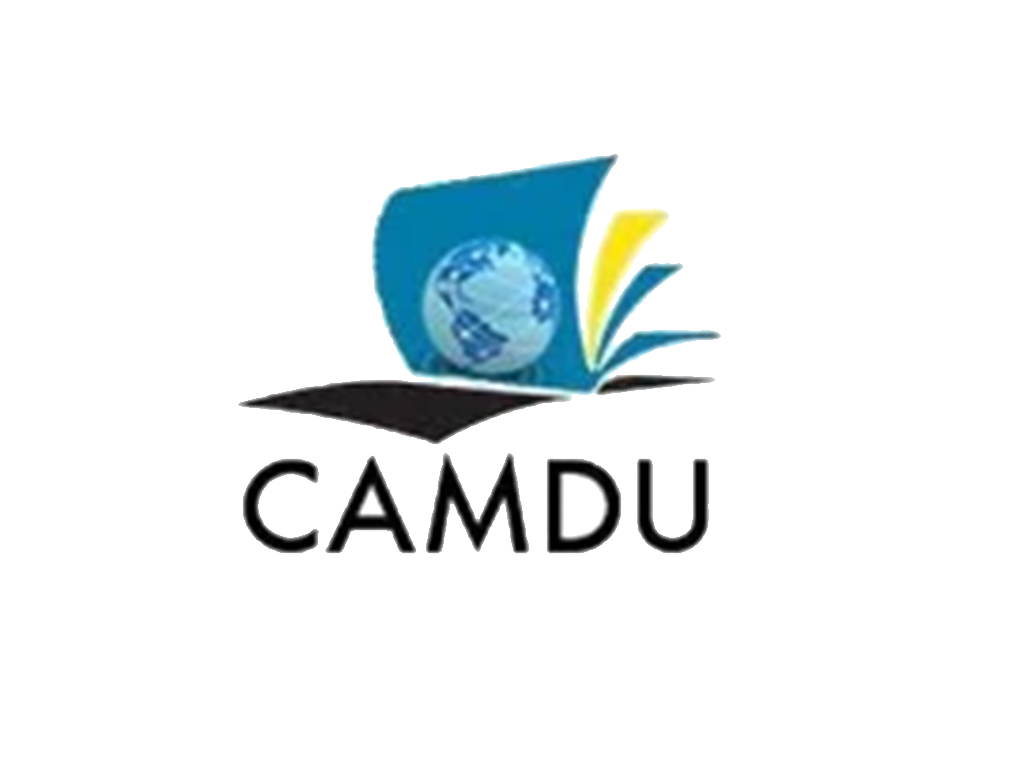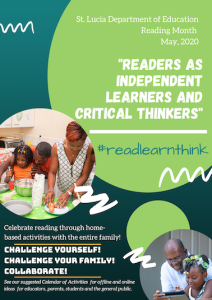Celebrating Reading Month May 2020
Concept Note for 2020
Angel Caglin
Curriculum Officer- English Language
Curriculum and Materials Development Unit (CAMDU) Department of Education, Innovation and Sustainable Development
The year 2020 may well forever be associated with the global Covid-19 pandemic. It has been the single, unprecedented event of our time that has succeeded in grinding almost to a halt all social and economic activity. However, events such as these are not only ideal for highlighting existing gaps, but perhaps more importantly, opportunities. It would therefore be remiss of us, as educators at all levels of this system, to allow the opportunities presented by this pandemic to go unexplored and unaddressed.
Background
The OECS Education Sector Strategy (OESS) in the section ‘Education in the OECS’ makes two important points that are significant to our present situation. The first relates to the ability of our countries to function effectively in a global economy. The OESS (2012, p.2) states: “Fully integrated into the global economy, improved competitiveness will increasingly matter to the OECS. A key constraint to growth is the development and deployment of the right types of skills. Education has an important role to play in addressing these challenges in the OECS.” In identifying one of the challenges of education in the OECS (p.4), it makes this second point:
Students leaving secondary school do not possess the critical thinking skills required for today’s labour market, let alone for the projected higher levels of knowledge and skills for future economies. Beyond certificates, employers require inter alia creative, critical thinkers; competences in interpreting data; the capacity to generate and communicate knowledge; ICT skills, ability to work in teams on complex tasks and to demonstrate appropriate work ethics.
Our very own Education Sector Development Plan (2015, p.12) cites as one of our priorities “Innovative learner support systems: efficient and effective support systems that enable learners to achieve their full potential.” One of the core corporate principles focus on innovation, stating that “Delivery of the “best education” cannot be fully accomplished by remaining attached to antiquated teaching methods and technologies. Our learners have changed and so must we. We must be innovative in both our content and delivery as opportunities continue to avail themselves.” (p. 15) This sector plan identified the need for risk management as it relates to education infrastructure, due to various factors including health factors.
While we may not have foreseen the advent of the novel Coronavirus (Covid-19), it is clear from the above strategy documents that we were aware of the need to be ready for such challenges. In order to live up to our name as a Ministry responsible for education, innovation and sustainable development, we must use this opportunity to improve how education is administered in St. Lucia. Predicated on that innovation, we may need to reevaluate what we consider as important in education. Herbert Spencer in his 1859 essay posed the question “What knowledge is of most worth?” The answer to that question is adjusted with our accumulated experiences, and social and economic needs.
Two of our most pressing educational needs, as a nation, is to develop independent learners and to facilitate critical thinking. Every educator knows the gradual release of responsibility model (Pearson & Gallagher, 1983), the end goal of which is a student who is a competent, independent learner. Pease and Carpenter (2013) recommend three skills to build independence: self-regulation, through modelling, reflection and feedback; persistence, through the use of formative assessment practices, including student self-assessment; and collaboration with peers, while assuming personal responsibility for contributions to the whole group.
Critical thinking refers to not just an ability, but also an attitude (Lamont, 2020). As critical thinkers, we must be able to evaluate information to determine its legitimacy, its bias and its intended effect. However, the results of this evaluation must be further put to use; a person must decide how to use this information to shape his or her own beliefs and actions, and to influence those of others. An independent learner and critical thinker would be an asset to self and community.
It is with the above in mind that we would like to adopt as our theme for this year’s Reading Month “Readers as Independent Learners and Critical Thinkers” with the #readlearnthink.
Objectives and Activities for Reading Month, 2020
Our objectives as it relates to Reading Month this year, and during this pandemic, must reflect the actual and varied circumstances of our learners. Furthermore, while our students remain our focus, there will be many opportunities for us as adults and as educators to improve our own attitudes towards initiative and critical thinking.
Goal 1: Our first aim is to support students as they become increasingly independent in their learning. Young children have a natural curiosity that can be capitalized on to encourage questioning, researching and sharing. Older children and young adults have a need for independently making decisions; this need can also be used to guide student learning. Considering student interests and circumstances and providing choice a re two ways of facilitating independent learning. The role of educators would then be to guide students in ways of locating and using the necessary information. Modeling the thought processes and actions for doing so, and allowing students opportunity to practice in their own personal environments will support this objective.
Goal 2: Our second objective is to help students become critical thinkers. Covid-19 has demonstrated that health and safety depend on making good decisions based on accurate information. Therefore, activities that encourage students to question content in the media, and to curate and create their own content will help them to develop improved attitudes towards information around them. Using audio, video and other collaborative media can help students to explore information in ways that appeal to them or that are familiar to them.
We wish all of our educators, parents, students and stakeholders the very best during this time, and encourage all to keep learning!
May 2020 Reading Month Calendar
References
Lamont, P. (2020, March 19). The Construction of “Critical Thinking”: Between How We Think and What We Believe. History of Psychology. Advance online publication.
Ministry of Education, Innovation, Gender Relations and Sustainable Development. (2015). Education Sector Development Plan.
OECS. (2012). OECS Education Sector Strategy. Organization of Eastern Caribbean States. retrieved from
https://www.collegesinstitutes.ca/wp-content/uploads/2014/05/OECS-Educ-Sector-Strate
gy-2012-2021-OESS-final-2012-05-18.pdf
Pearson, P.D., & Gallagher, M.C. (1983). The instruction of reading comprehension. Contemporary Educational Psychology, 8(3), 317–344
Pease, Jennifer S. and Carpenter, Jeffrey P. (2013). Putting students at the center. ASCD Express, Volume 8, Issue 11. Retrieved from http://www.ascd.org/ascd-express/vol8/811-pease.aspx

